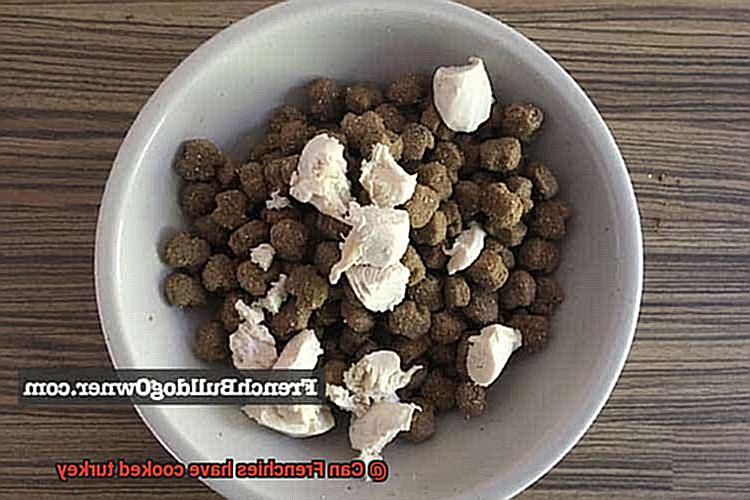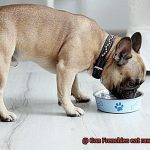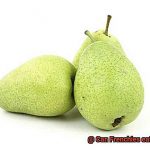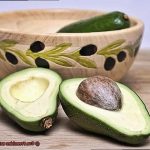Can Frenchies have cooked turkey?
We know how much you adore those adorable, snorting bundles of joy. But when it comes to their diet, finding the perfect balance between deliciousness and safety can be quite the challenge. As we gear up for the upcoming feast-filled festivities, one question looms large – Can Frenchies have cooked turkey?
In this tantalizing blog post, we’re here to unravel the mystery and help you make an informed decision about sharing that scrumptious turkey dinner with your furry companion. While our hearts may yearn to indulge our Frenchies in holiday treats, it’s crucial to understand the potential risks that certain foods, like cooked turkey, may pose.
Join us on this culinary adventure as we explore the nutritional aspects and potential hazards associated with including cooked turkey in your Frenchie’s diet. Together, we’ll navigate this gastronomic puzzle and ensure your Frenchie stays safe and satisfied throughout this festive season.
So, grab a cup of coffee (or maybe some turkey leftovers) and let’s dive into this delectable dilemma.
Benefits of Feeding Cooked Turkey to French Bulldogs
Contents
- 1 Benefits of Feeding Cooked Turkey to French Bulldogs
- 2 Nutritional Requirements for French Bulldogs
- 3 How to Prepare and Feed Cooked Turkey to Your Frenchie
- 4 Potential Risks of Feeding Cooked Turkey to French Bulldogs
- 5 How Much Cooked Turkey Can a Frenchie Have?
- 6 Signs of Intolerance or Allergies in Frenchies
- 7 What Are the Alternatives to Feeding Cooked Turkey?
- 8 Tips for Introducing New Foods To Your Frenchie’s Diet
- 9 Conclusion
Not only is it a delicious treat, but it also offers numerous benefits for your furry friend. In this article, we’ll explore the paw-sitive reasons why feeding cooked turkey to French Bulldogs can be a wag-tastic idea.
Protein Powerhouse:
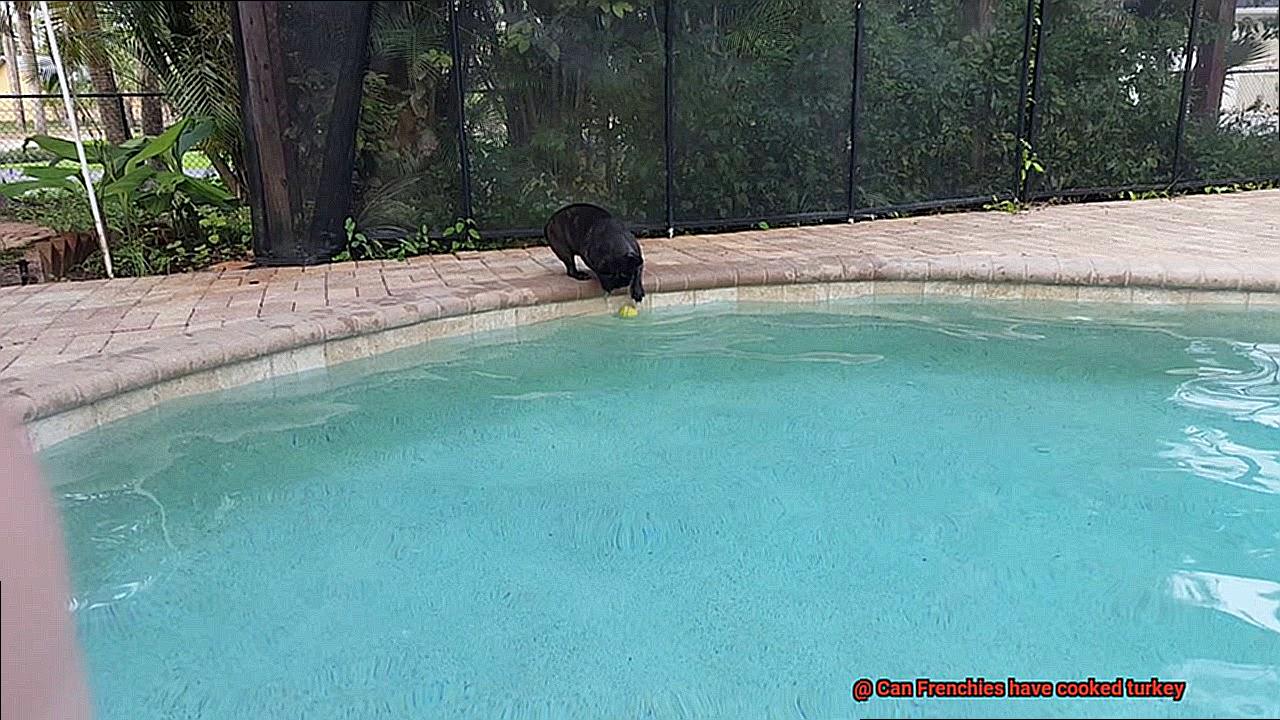
Cooked turkey is packed with protein, which is vital for the overall health and development of your Frenchie. Protein helps build strong muscles, repair tissues, and provide energy for their playful antics. So, serving up some tender cooked turkey will keep your French Bulldog feeling strong and ready to conquer the world (or at least the living room).
Low in Fat, High in Health:
Compared to other meats, turkey is lower in fat, making it a healthier option for French Bulldogs prone to weight gain or obesity. By incorporating cooked turkey into their diet, you can help them maintain a healthy weight and prevent related health issues such as joint problems or heart conditions. So, say goodbye to those extra pounds and hello to a happier and healthier Frenchie.
Nutrient-Rich Goodness:
Cooked turkey is not only delicious but also jam-packed with essential vitamins and minerals that your Frenchie needs. From iron and zinc to potassium and B vitamins, these nutrients support a strong immune system, promote healthy digestion, and ensure optimal organ function. Think of it as a nutrient boost that will keep your Frenchie feeling paw-some from nose to tail.
Variety for Picky Eaters:
Does your Frenchie have discerning taste buds? Worry not. Including cooked turkey in their diet offers a variety of flavors and textures that can entice even the pickiest eaters. So, whether your Frenchie prefers a gourmet feast or a simple yet delicious meal, cooked turkey is sure to make their taste buds dance with joy.
Allergy-Friendly Alternative:
If your Frenchie has food sensitivities or allergies, cooked turkey can be a safer protein option compared to other meats. It’s known to be less allergenic, meaning it’s less likely to cause adverse reactions. By feeding cooked turkey, you can satisfy their cravings without worrying about tummy troubles or uncomfortable itchiness.
Nutritional Requirements for French Bulldogs
Protein is a crucial component of a French Bulldog’s diet. It plays a vital role in muscle development and repair, as well as the production of enzymes and hormones. Cooked turkey can be an excellent source of lean protein for your Frenchie. However, it is important to prepare it properly. Remove any bones, skin, and excess fat before feeding it to your furry friend. Additionally, ensure that the turkey is thoroughly cooked to eliminate the risk of bacterial contamination.
Carbohydrate Energy: Fueling Their Playful Nature
French Bulldogs are energetic little bundles of joy. To keep them fueled throughout the day, they require carbohydrates for energy. Good sources of carbohydrates for French Bulldogs include cooked rice, potatoes, and sweet potatoes. Mash these ingredients before feeding them to your Frenchie to aid in digestion.
Fantastic Fats: Essential for Energy and Vitamin Absorption
Fats are another important component of a French Bulldog’s diet. They provide energy and help with the absorption of fat-soluble vitamins. When it comes to fats, choose healthy options like fish oil or olive oil rather than unhealthy fats found in fried foods or fatty meats.
Vital Vitamins and Mighty Minerals: Supporting Overall Health
Vitamins and minerals play a crucial role in maintaining a French Bulldog’s overall health. They contribute to a strong immune system and support various bodily functions. While cooked turkey does contain some vitamins and minerals, it may not provide all the necessary ones. It is important to supplement your Frenchie’s diet with high-quality dog food that contains a balanced blend of these essential nutrients.
Water: The Elixir of Life
Don’t forget about water. It is an essential nutrient for French Bulldogs. Water helps regulate body temperature, aids in digestion, and supports overall hydration. Make sure your Frenchie has access to fresh, clean water at all times.
Tailoring the Diet to Your Frenchie’s Needs
Every dog is unique, and French Bulldogs may have specific dietary needs or restrictions. Some may have allergies or sensitivities to certain ingredients. It is important to monitor their reaction to new foods and consult with a veterinarian if you have any concerns or questions about their diet.
How to Prepare and Feed Cooked Turkey to Your Frenchie
French Bulldogs are known for their adorable wrinkled faces and playful personalities. As loving pet parents, we want to provide them with the best care and nutrition possible. One way to do that is by introducing cooked turkey into their diet. However, it’s important to prepare and feed cooked turkey to your Frenchie in the right way to ensure their health and safety.
Choose the Right Turkey:
When preparing cooked turkey for your Frenchie, opt for plain, unseasoned, boneless, and skinless turkey meat. Seasonings like garlic or onion can be harmful to dogs, while bones and skin pose choking hazards.
Cook it Thoroughly:
To eliminate any potential bacteria or parasites that could harm your Frenchie, make sure to cook the turkey thoroughly. Roast or boil the turkey until it reaches an internal temperature of 165°F (74°C).
Portion Control is Key:
While cooked turkey can be a healthy addition to your Frenchie’s diet, moderation is essential. Overfeeding can lead to digestive issues and weight gain. Serve small amounts as an occasional treat or mix it with their regular dog food for added flavor.
Remove Skin, Bones, and Excess Fat:
Before serving cooked turkey to your Frenchie, ensure you remove any skin, bones, or excess fat. These can pose choking hazards or cause gastrointestinal blockages.
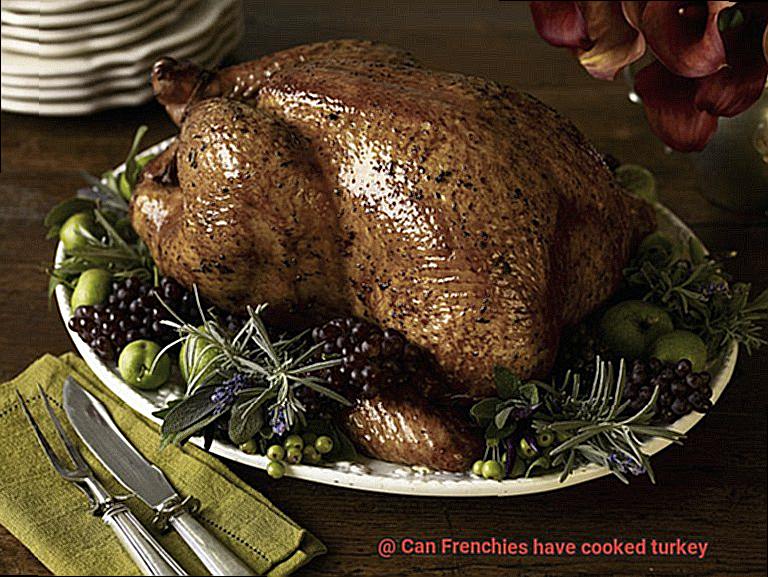
Alternative Cooking Methods:
If you find that roasting or boiling the turkey is difficult for your Frenchie to digest, try alternative cooking methods like baking or boiling it in water without seasoning. This can make it easier for them to enjoy this tasty treat without any tummy troubles.
Potential Risks of Feeding Cooked Turkey to French Bulldogs
French Bulldogs bring so much joy into our lives with their unique personalities and lovable nature. As responsible pet owners, we want to provide them with the best care and nutrition.
While cooked turkey may seem like a tasty treat for your Frenchie, it’s important to be aware of the potential risks associated with feeding it to them. In this article, we will explore the potential dangers and offer tips to keep your French Bulldog safe.
Cooked Turkey Bones:
Cooked bones, especially those from poultry, can pose serious risks to dogs. They can splinter easily and cause choking hazards or internal injuries if ingested. To keep your Frenchie safe, always ensure that cooked turkey bones are kept out of their reach.
Seasonings and Spices:
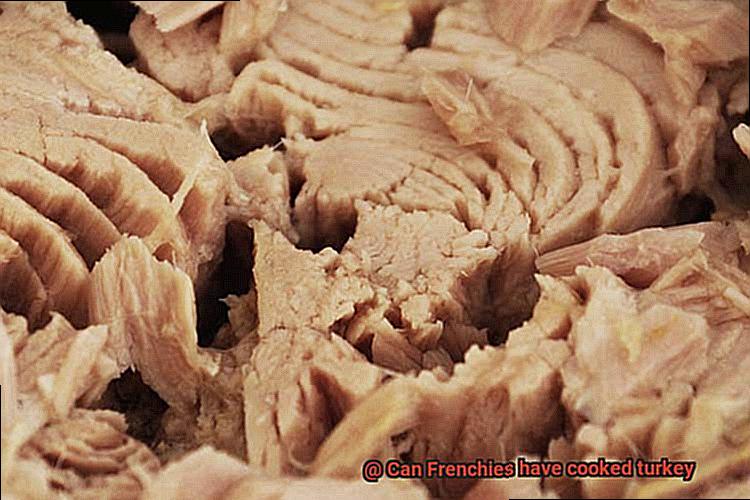
Many seasonings and spices used in cooking turkey can be toxic to dogs, including French Bulldogs. Ingredients like garlic, onion, and certain herbs can lead to gastrointestinal upset, anemia, or damage to red blood cells. It’s best to avoid feeding seasoned or heavily spiced cooked turkey to your Frenchie.
High Fat Content:
French Bulldogs are prone to obesity and pancreatitis, making it essential to monitor their fat intake. Cooked turkey with the skin or excessive fat can contribute to weight gain and potentially trigger pancreatitis in French Bulldogs. Always remove the skin and excess fat before offering cooked turkey to your Frenchie.
Food Contamination:
Improper handling, storage, or cooking of turkey can lead to food contamination by bacteria such as Salmonella or Campylobacter. These bacteria can cause food poisoning in dogs, resulting in symptoms like vomiting, diarrhea, and dehydration. Prioritize food safety by ensuring the cooked turkey is safe for consumption before feeding it to your French Bulldog.
Allergies and Sensitivities:
Just like humans, dogs can have allergies or sensitivities to certain proteins present in turkey meat. If your Frenchie shows signs of skin irritations, itching, or digestive issues after consuming turkey, they may have an allergy or sensitivity. Consult with your veterinarian to determine if turkey is suitable for your Frenchie’s diet.
How Much Cooked Turkey Can a Frenchie Have?
The holiday season is here, and that means turkey feasts are just around the corner. As a proud Frenchie owner, you may be wondering if it’s safe to share some of that delicious cooked turkey with your four-legged friend.
I’m here to provide you with all the expert advice you need to make sure your Frenchie enjoys a tasty treat without any health risks.
Moderation is Key:
French Bulldogs have sensitive tummies, so it’s important to remember that moderation is key when it comes to feeding them cooked turkey. Too much turkey can lead to digestive issues like diarrhea or vomiting. So, keep those portions small and controlled.
Consider Their Needs:
The amount of cooked turkey your Frenchie can safely consume depends on factors like their size, weight, age, and overall health. To determine the appropriate serving size, consult your veterinarian who can provide tailored recommendations based on your Frenchie’s individual needs.
Caloric Intake:
As a general guideline, treats or extras should account for no more than 10% of your Frenchie’s total daily caloric intake. Let’s say your pup requires 500 calories per day – that means they shouldn’t have more than 50 calories from cooked turkey.
Preparation and Ingredients:
When offering cooked turkey to your Frenchie, keep it simple and avoid seasoning or additives. Excessive salt or spices can upset their stomachs. Opt for plain, unseasoned cooked turkey without bones or skin. Bones can pose a choking hazard or cause internal injuries, while fatty skin can be hard for French Bulldogs to digest.
Balanced Diet:
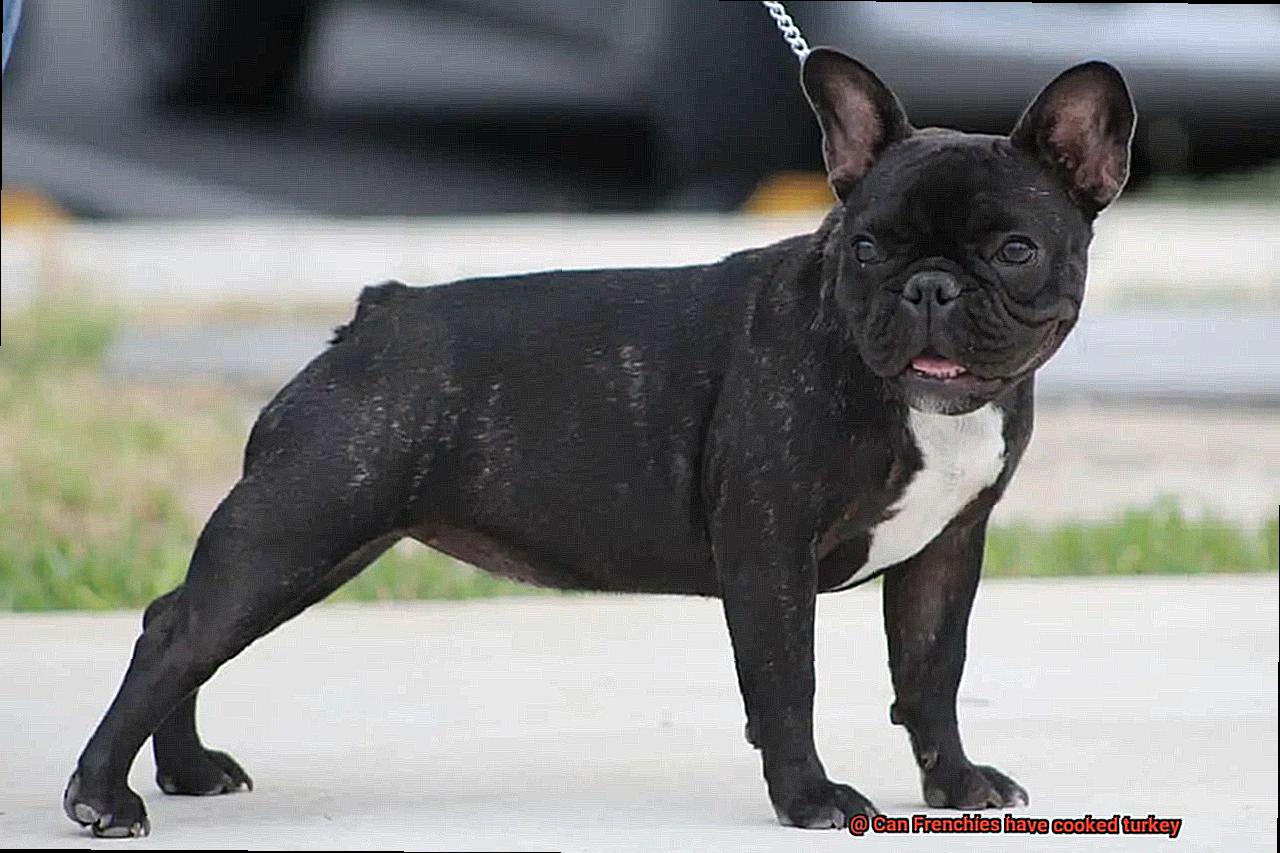
Remember, treats should never replace a balanced and nutritious diet for your Frenchie. Cooked turkey should only be an occasional addition to their meals. Make sure to feed them a well-balanced diet specifically formulated for French Bulldogs, meeting their nutritional requirements.
Signs of Intolerance or Allergies in Frenchies
As a Frenchie owner, it’s important to be aware of the signs and symptoms of intolerance or allergies in your furry friend. Just like humans, French Bulldogs can develop allergies or intolerances to certain foods. In this article, I’ll walk you through the common signs to look out for and what you can do to keep your Frenchie healthy and happy.
Itching and Skin Issues
One of the most common signs of food allergies or intolerances in Frenchies is itching and redness of the skin. If you notice your Frenchie scratching excessively, developing rashes, or experiencing inflamed skin, it could be a sign of a food allergy or intolerance.
Gastrointestinal Problems
French Bulldogs with food allergies or intolerances may experience gastrointestinal issues such as diarrhea or vomiting after consuming certain foods. If you notice these symptoms occurring shortly after your Frenchie has eaten, it’s important to consult with a veterinarian for a proper diagnosis.
Ear Infections
Food allergies can also manifest as recurrent ear infections in French Bulldogs. If your Frenchie is constantly shaking their head, scratching their ears, or has a foul odor coming from their ears, it could be a sign of an allergic reaction.
Respiratory Problems
In some cases, food allergies or intolerances can cause respiratory problems in French Bulldogs. If you notice your Frenchie wheezing, coughing, or having difficulty breathing after eating certain foods, it’s crucial to seek veterinary attention.
Misdiagnosis
It’s worth noting that the symptoms of food allergies or intolerances can sometimes be mistaken for other conditions such as environmental allergies or infections. That’s why it’s important to consult with a veterinarian for an accurate diagnosis.
Once a food allergy or intolerance is identified, the most effective treatment is to eliminate the problematic food from your Frenchie’s diet. This means avoiding cooked turkey or any other food that triggers an allergic reaction or intolerance. Remember, it’s not just the turkey itself that can be harmful but also the seasonings or additives commonly used in cooking.
What Are the Alternatives to Feeding Cooked Turkey?
When it comes to keeping our French Bulldogs happy and healthy, providing them with a balanced diet is crucial. While cooked turkey is a popular choice for many dog owners, there may be instances where it is not suitable or desired for your Frenchie. In this blog post, we will explore some delicious alternatives to feeding cooked turkey that will keep your furry friend satisfied and nourished.
Raw Turkey:
Raw feeding, also known as the BARF diet, is gaining popularity among French Bulldog owners. Raw turkey can offer similar nutritional benefits to cooked turkey, including high-quality protein and essential vitamins and minerals. However, it is important to source raw turkey from reputable suppliers and handle it safely to minimize the risk of bacterial contamination.
Commercially Available Dog Food:
If raw feeding is not your preference or not suitable for your Frenchie, there are plenty of commercially available dog food options to consider. Many pet food companies offer turkey-based formulas that are specifically formulated to meet the nutritional needs of dogs. Look for brands that use high-quality ingredients and have a good reputation for producing safe and nutritious dog food.
Alternative Protein Sources:
If you want to provide variety or find alternatives to turkey altogether, there are other protein sources you can explore. Chicken, beef, lamb, and fish are common alternatives that can be cooked or included in commercially available dog food formulas. These protein sources offer their unique nutritional profiles and can help diversify your Frenchie’s diet.
Gradual Dietary Changes:
It is important to introduce any dietary changes gradually to avoid digestive upset in your Frenchie. Start by mixing small amounts of the new protein or dog food with their current diet and gradually increase the proportion over several days or weeks. This will allow their digestive system to adjust smoothly.
Seek Professional Advice:
Consulting with a veterinarian or a professional canine nutritionist can provide valuable guidance when exploring alternatives to feeding cooked turkey. They can offer personalized advice based on your Frenchie’s specific needs, health conditions, and dietary requirements.
Tips for Introducing New Foods To Your Frenchie’s Diet
We all want the best for our French Bulldogs, and that includes providing them with a nutritious and balanced diet. While commercial dog food is a staple, many pet owners also like to incorporate some homemade treats into their Frenchie’s meals. One such treat is cooked turkey. However, it’s essential to introduce new foods gradually and with caution. In this article, we’ll explore some tips for introducing cooked turkey to your Frenchie’s diet.
Start with small portions:
When introducing a new food to your Frenchie’s diet, it’s important to start with small portions. This allows you to monitor their reaction and ensure that they tolerate the new food well. Begin by offering just a tiny amount of cooked turkey and observe how your Frenchie responds.
Gradually increase the amount:
Once you have determined that your Frenchie tolerates cooked turkey without any adverse reactions, you can gradually increase the portion size. Add a bit more cooked turkey to their meals over a few days, monitoring them closely for any signs of digestive upset or allergies.
Monitor for allergies:
Frenchies, like any other breed, can develop food allergies. Some common signs of food allergies include itching, rashes, gastrointestinal issues (such as vomiting or diarrhea), and ear infections. If you notice any of these symptoms after introducing cooked turkey to your Frenchie’s diet, consult with your veterinarian to rule out any potential allergies.
Variety is key:
While cooked turkey can be a great addition to your Frenchie’s diet, it’s important to provide a balanced and varied diet overall. This means incorporating other protein sources, such as chicken or fish, as well as vegetables and grains. Aim for a well-rounded diet that meets your Frenchie’s nutritional needs.
Avoid seasoning and additives:
When offering cooked turkey to your Frenchie, make sure it is plain and free from any seasoning or additives. Garlic, onions, and certain spices can be toxic to dogs and should be avoided. Stick to plain, unseasoned cooked turkey to ensure it is safe for your Frenchie to consume.
Consult with your veterinarian:
As always, it’s important to consult with your veterinarian before making any significant changes to your Frenchie’s diet. They can provide personalized advice based on your dog’s specific needs and health condition.
Introducing new foods to your Frenchie’s diet can be an exciting adventure, but it’s crucial to proceed with caution.
By starting with small portions, gradually increasing the amount, monitoring for allergies, providing variety, avoiding seasonings and additives, and consulting with your veterinarian, you can safely incorporate cooked turkey into your Frenchie’s diet as a tasty and nutritious addition.
Remember, a balanced diet is key to keeping your Frenchie happy and healthy.
rp4VO9PU9UI” >
Conclusion
In conclusion, it is safe for Frenchies to enjoy cooked turkey as part of their diet.
However, there are a few important considerations to keep in mind. Firstly, the turkey should be thoroughly cooked to eliminate any potential bacteria or parasites that could harm your furry friend.
Secondly, it’s crucial to remove the skin and bones before serving it to your Frenchie, as these can pose choking hazards or cause digestive issues. Lastly, remember that moderation is key – while turkey can be a tasty treat for your Frenchie, it should not make up the majority of their diet.
By following these guidelines and consulting with your veterinarian if you have any concerns, you can ensure that your Frenchie enjoys a safe and delicious Thanksgiving feast alongside the rest of the family.
